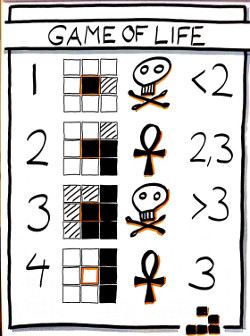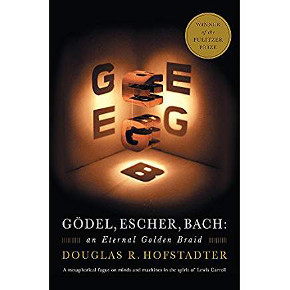Review: Genius at Play by Siobhan Roberts
When I’m drowning in the desire to read “something different” but have no idea what the subject might be, I go to Books Upstairs on D’Olier Street. Last week they didn’t disappoint me when I stumbled upon a biography of one of my great heroes, John Horton Conway, which I hadn’t known existed.

I’ll accept that unless your NQ1 is fairly high, you have possibly never even heard of JHC but I’m here to tell you that you’re all the poorer for this. He is perhaps the most quirky, playful and creative professor of mathematics to ever to grace the halls of Cambridge and Princeton.
Alert!!! Don’t switch off
For “mathematics” read “GAMES”
So how would an ordinary mortal come to hear of him? Well he sprang to prominence when Scientific American’s equally nerd-adored Martin Gardiner published article after article describing his Game of Life (play it here); what Conway calls a zero-player game. The biography reveals that although he revels in the fame it brought, he also bemoans how it has cast a deep shadow over his other accomplishments.
Like Einstein in 1905, he had his annus mirabilis in 1969 inventing ‘Life’, describing the Monster Group (… don’t go there …) and inventing what I think he will eventually be best remembered for: the Surreal Number which I like to call 𝕊. Don’t get me going on them; I won’t stop.
So why am I bothering to write this up and attract your witty rejoinders? Because this is laugh-out-loud biography. Conway is a (deliberately) larger than life man, who claims never to have worked a day in his life and he must be, by far, the most entertaining educator ever. It’s so interesting to see also the complete (artistic!) freedom that academia awards to someone like him to “waste” countless hours playing and fooling-around in, no doubt, the confident belief that genius has its own path to follow.
I read this 400-page biography in 3 days; it’s un-put-downable. This is a book about the full expression of creativity and his biographer adopts his quirkiness in her presentation of him. To her credit, she shows him warts and all but at the end, warts aside, I still revere him!
1. Nerd Quotient↩

 Gödel’s theorem represents to me one of the high intellectual achievements of the 20th century. It was a devastating hammer-blow to mathematicians; imagine that you’ve given your life’s work to proving, say, Goldberg’s Conjecture. Gödel says that not everything that is true is provable; so maybe you’ve wasted your life on one such unprovable conjecture! (The very fine novel: Uncle Petros and Goldbach’s Conjecture by Apostolos Doxiadis imagined just such an outcome and is well worth reading).
Gödel’s theorem represents to me one of the high intellectual achievements of the 20th century. It was a devastating hammer-blow to mathematicians; imagine that you’ve given your life’s work to proving, say, Goldberg’s Conjecture. Gödel says that not everything that is true is provable; so maybe you’ve wasted your life on one such unprovable conjecture! (The very fine novel: Uncle Petros and Goldbach’s Conjecture by Apostolos Doxiadis imagined just such an outcome and is well worth reading).